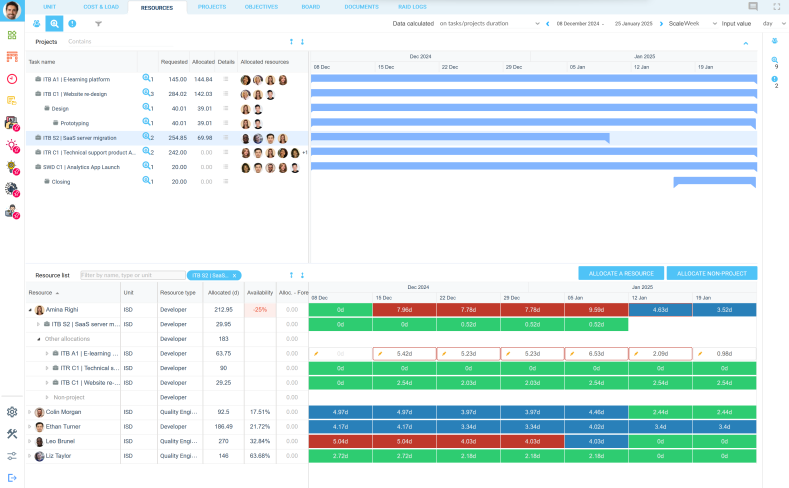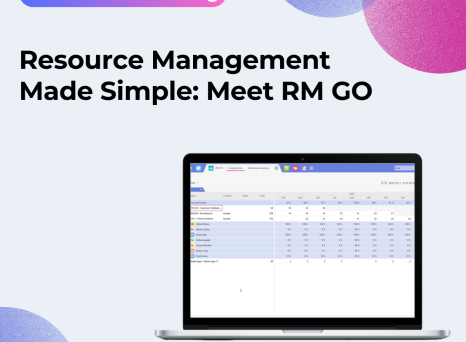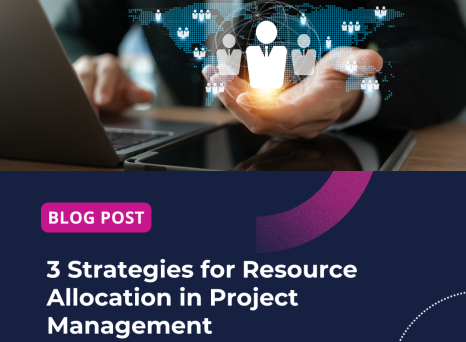What is resource management?
In the context of PPM, resource management is a set of tools, strategies, and techniques used to plan, schedule and allocate resources within a project, program, or portfolio. It is an ongoing process of estimating, procuring, and deploying resources effectively and appropriately throughout its lifecycle, in order to drive maximum value for an organization.
Whereas capacity planning is concerned with the organization as a whole and considers resources from a high-level point of view, resource management handles resources more actively and with more granularity within a smaller perimeter (a project, a program, or a portfolio). It requires an on-demand, real-time overview of resources—workforce skills, budget, inventory, technical infrastructure, and production resources.
The aim of resource management is to choose the optimal number of resources to meet requirements of a project, and ensure these are spent as efficiently as possible—after all, resources are shared and can be valuable elsewhere in the organization.
Effective resource management requires transparency over all of these finite resources. Rather than allocating them randomly or arbitrarily, they should be deployed in the most strategic, effective, and economical way for the organization. Essentially, effective resource management means allocating resources to the right initiatives, with the aim of avoiding project failure, delay, or overspend.
Resource management requires an understanding of demand, capacity, corporate strategy, timings, and the skills available across the organization.
Types of resources in project management
Anything that helps you to complete a project, program, or portfolio can be classified as a resource. This commonly includes:
- People: Team members, employees, contractors, consultants, and vendors.
- Time: Time available to complete the project.
- Finance: Project budget and funding.
- Physical: Inventory, equipment, raw materials, offices, workspace, and warehouses.
- Technical: Software, tools, automated processes, data,and project timelines.

What are the benefits of resource management?
Good resource management means estimating, planning, and deploying resources judiciously. It increases the likelihood that projects are completed on time, within budget, and to a high standard.
- Project efficiency and outcomes: Underallocation of resources is the most obvious and most common cause of project failure and missed milestones. Projects that have an optimized allocation of resources are most likely to succeed, avoid bottlenecks, and minimize wasted resources (such as an overallocation of resources.)
- Scheduling and prioritization: Good resource management requires real-time insights into resource availability, allowing for smarter, proactive decisions about staffing and skills on certain projects—including whether to accept or reject new projects. It allows for prioritization of projects that deliver the most value and competitive advantage.
- Employee morale: Effective resource management means that team members have clarity about their roles. They will be allocated to the right tasks for their abilities, have the correct tools, and will not be over-utilized. This all means they are more likely to feel valued and supported—and less likely to feel stressed or frustrated.
- Setting expectations: Clear transparency into timelines, employee workload, budgets, and deliverables allows managers to set expectations for delivery to stakeholders and give clear, consistent updates on the progress of a project, program, or portfolio.
- Customer satisfaction: Because skillful resource management means that projects are fulfilled on-time, on-budget, and to a high standard, the customer typically enjoys a superior end product.
Effective resource management can be challenging. It is a continuous process, and managing multiple, dynamic projects means that resource requirements can change quickly. This can require regular adjustment or reallocation to keep a project or program on track. Resource management also requires a good understanding of the project’s requirements and skillsets of the team members.
Planisware’s intuitive, clear dashboards and innovative, industry-leading tools help you to manage and plan resources across your entire organization, revolutionizing your PPM processes. Learn more about our products and request a demo today.


